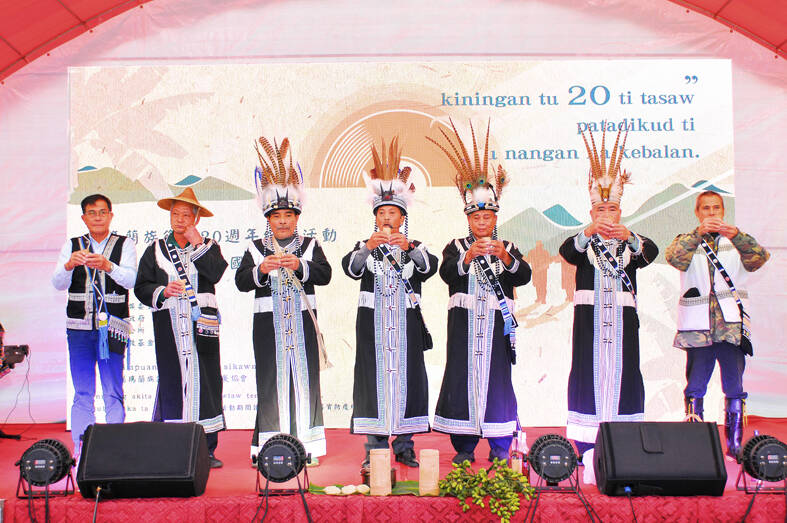The Kavalan community on Saturday celebrated the 20th anniversary of being granted official recognition as the nation’s 11th indigenous community.
The event was held in Hsinshe Village (新社) of Hualien County’s Fengbin Township (豐濱), home to the nation’s largest Kavalan population. The village is known as pateRungan in the Kavalan language.
Only about 1,500 Kavalan remain in Taiwan, Council of Indigenous Peoples data show.

Photo: Hua Meng-ching, Taipei Times
An awards ceremony was also held to recognize young Kavalan who passed the community’s language proficiency test, which aims to assist preservation of the language. The community presented NT$1,000 to each of the 20 people who obtained the Kavalan language certificate during the past year.
The gala featured a Kavalan youth forum along with traditional music and dance performances.
Kavalan filmmaker Bauki Angaw also premiered his new movie, which he filmed throughout three decades to record the lives of Kavalan, including their fight for recognition.
The celebration was meaningful, as it was organized by the Taiwan Kavalan Language and Culture Promotion Association, which is run by mostly young people, Bauki said.
It was the first time those who passed the language proficiency tests received awards, he said.
The award money came from the authorization fees from businesses that signed contracts with the community under the Indigenous Peoples Intellectual Property Act (原住民族傳統智慧創作保護條例), Bauki said.
The money obtained through the act is managed by a dedicated committee, and the revenue is used to revitalize the Kavalan culture and language, he said.
He said he hopes the community can create an environment for elderly and young people to learn the Kavalan language together.
Abas, or Pan Ssu-jung (潘思蓉), a fifth-grader at Hsinshe Elementary School in Fengbin Township, passed the elementary and intermediate-level tests in the past year and was awarded NT$2,000 on Saturday.
She said she enjoyed learning languages through games with friends at school, adding that indigenous people should learn their native language to retain their culture.
Wanu, or Pan Kai-wei (潘楷崴), a sixth-grader at Yilan County’s Wujie Junior High School, also passed the tests and received NT$2,000.
He said he learned the Kavalan language along with his family from a teacher who visits their village every week, as well as from school teachers.
Wanu is the only student in his class who is learning the Kavalan language, so he does not find many opportunities to practice it, he said.
He considers learning the language essential and is proud to be Kavalan, he added.
The Kavalan originally lived in Yilan County’s Lanyang Plain (蘭陽平原), but were forced to move to Hualien’s Karewan Village (加禮宛) by the Han Chinese.
They later joined with the Sakizaya people to fight against a Han Chinese invasion during the Qing Dynasty, which is also known as the Karewan Incident.
The Kavalan then scattered across the area from Hualien’s Fengbin Township to Taitung’s Changbin Township (長濱).
The Kavalan in Yilan County established several villages in the county’s Jhuangwei (壯圍) and Wujie (五結) townships.
Kavalan villages in Yilan, Hualien and Taitung now engage in frequent exchanges.

STAY AWAY: An official said people should avoid disturbing snakes, as most do not actively attack humans, but would react defensively if threatened Taitung County authorities yesterday urged the public to stay vigilant and avoid disturbing snakes in the wild, following five reported snakebite cases in the county so far this year. Taitung County Fire Department secretary Lin Chien-cheng (林建誠) said two of the cases were in Donghe Township (東河) and involved the Taiwan habus, one person was bit by a Chinese pit viper near the South Link Railway and the remaining two were caused by unidentified snakes. He advised residents near fields to be cautious of snakes hiding in shady indoor areas, especially when entering or leaving their homes at night. In case of a

A tropical disturbance off the southeastern coast of the Philippines might become the first typhoon of the western Pacific typhoon season, the Central Weather Administration (CWA) said. The system lacks a visible center and how it would develop is only likely to become clear on Sunday or Monday, the CWA said, adding that it was not yet possible to forecast the potential typhoon's effect on Taiwan. The American Meteorological Society defines a tropical disturbance as a system made up of showers and thunderstorms that lasts for at least 24 hours and does not have closed wind circulation.

ENERGY RESILIENCE: Although Alaska is open for investments, Taiwan is sourcing its gas from the Middle East, and the sea routes carry risks, Ho Cheng-hui said US government officials’ high-profile reception of a Taiwanese representative at the Alaska Sustainable Energy Conference indicated the emergence of an Indo-Pacific energy resilience alliance, an academic said. Presidential Office Secretary-General Pan Men-an (潘孟安) attended the conference in Alaska on Thursday last week at the invitation of the US government. Pan visited oil and gas facilities with senior US officials, including US Secretary of the Interior Doug Burgum, US Secretary of Energy Chris Wright, Alaska Governor Mike Dunleavy and US Senator Daniel Sullivan. Pan attending the conference on behalf of President William Lai (賴清德) shows a significant elevation in diplomatic representation,

Credit departments of farmers’ and fishers’ associations blocked a total of more than NT$180 million (US$6.01 million) from being lost to scams last year, National Police Agency (NPA) data showed. The Agricultural Finance Agency (AFA) said last week that staff of farmers’ and fishers’ associations’ credit departments are required to implement fraud prevention measures when they serve clients at the counter. They would ask clients about personal financial management activities whenever they suspect there might be a fraud situation, and would immediately report the incident to local authorities, which would send police officers to the site to help, it said. NPA data showed